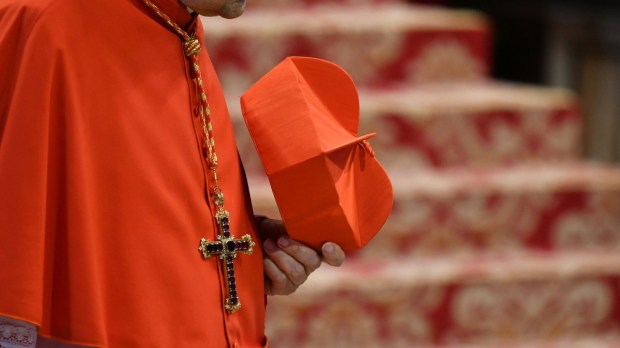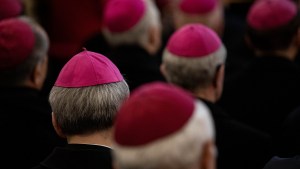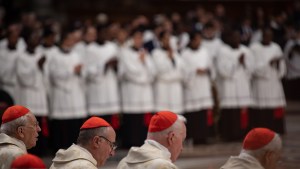On July 9, Pope Francis announced the creation of 21 new cardinals, including 18 electors, for the next consistory scheduled for September 30. Eight of the new cardinals are European, giving a Western tinge to the new entries, which represent 13% of the total electoral college.
As summer begins, Pope Francis seems to be keeping up the pace, despite his recent hospitalization from June 7 to 16 for abdominal surgery. He continues to receive audiences — including during his summer break — and he just announced at the Angelus on July 9 that a consistory will be held to create 21 cardinals, including 18 electors, on September 30, on the eve of the Synod on the Future of the Church.
By the evening of September 30, 99 of the 137 cardinal electors — almost three quarters of them — will be men chosen by the Argentine Pope. This ninth consistory convened by the Argentine Pope since his election in 2013 hasa strong European focus. The Pontiff has chosen two Frenchmen (François-Xavier Bustillo, bishop of Ajaccio, and Archbishop Christophe Pierre, apostolic nuncio to the United States), two Spaniards (José Cobo Cano, archbishop of Madrid, and Fr. Ángel Fernández Artime, rector major of the Salesians), a Portuguese (Bishop Américo Manuel Alves Aguiar, auxiliary bishop of Lisbon), a Swiss (Archbishop Emil Paul Tscherrig, apostolic nuncio to Italy), a Pole (Grzegorz Ryś, archbishop of Łódź), and an Italian (Archbishop Claudio Gugerotti, prefect of the Dicastery for Eastern Churches).
Another Italian is among the designated cardinals, although he’s counted in the Middle East by virtue of his mission. He is the Latin Patriarch of Jerusalem, Archbishop Pierbattista Pizzaballa.
Three cardinals from the Roman Curia
The inclusion of three important prefects in the workings of the Roman Curia was already expected: Archbishop Robert Francis Prevost, prefect of the Dicastery for Bishops, Archbishop Claudio Gugerotti, prefect of the Dicastery for Eastern Churches, and Archbishop Víctor Manuel Fernández, prefect of the Dicastery for the Doctrine of the Faith.
Asia and Africa
This new group of cardinals doesn’t fundamentally upset the balance within the College of Cardinals. However, in addition to strengthening the influence of Europe — its share has stopped decreasing — it’s worth noting the change in the proportion of Asian cardinals, maintained at 16.1%. Only two new cardinal electors will come from Asia: Bishop Stephen Chow Sau-Yan of Hong Kong and Bishop Sebastian Francis of Penang in Malaysia. In recent years, the number of Asian cardinals has risen sharply, from 7.9% of the college that elected Francis.
Three new African cardinals will join the College of Cardinals, bringing to 19 the number of African cardinal electors in the event of a conclave, i.e. almost 14% of the college of electors. There were only 11 at the 2013 conclave, or 9.6%.
Eight months after Pope Francis’ visit, South Sudan will have its first cardinal (Archbishop Stephen Ameyu Martin Mulla of Juba). The other two African cardinals are from South Africa (Archbishop Stephen Brislin of Cape Town) and Tanzania (Archbishop Protase Rugambwa, Coadjutor Bishop of Tabora).
Various religious congregations are also represented among the 18 new electors in the event of a conclave: two Franciscans, two Jesuits, a Salesian, and an Augustinian.
Men who share the Pope’s priorities
Beyond their geographical origins, the prelates chosen by Pope Francis also reflect his priorities. With the surprising promotion of the discreet Apostolic Nuncio to the United States, Archbishop Christophe Pierre, the Pope might be sending a signal of unity to American bishops, in the context of the ideological polarization of their country.
For his part, Archbishop Grzegorz Ryś in Poland embodies a line of openness to ecumenical and interreligious issues, a focus still relatively rare in that land of rather traditional and homogeneous Catholicism.
The very young auxiliary bishop of Lisbon, Bishop Américo Manuel Alves Aguiar, 49, is being encouraged in his preparations for the WYD, for which he is coordinator, and will probably be called upon to take on new responsibilities.
Once again, Pope Francis has broken away from the tradition of assigning cardinals to major dioceses (Paris, Milan, Turin, Venice, Prague, and Naples remain without a cardinal), preferring to mark out personal priorities tracing a pastoral line for the decades to come. Also absent from this list is the major archbishop of the Ukrainian Greek Catholic Church, Sviatoslav Shevchuk. The Pope thus confirms his line of prudence and distance in the context of the war in Ukraine, even if it means provoking perplexity and incomprehension within this martyred Church.



